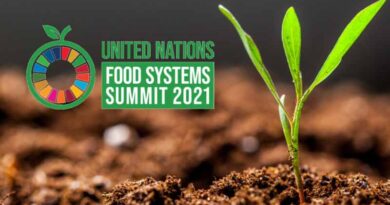Rethinking What Responsible Plant Nutrition Means Today: New Paradigm
11 May 2022, Africa: A scientific panel comprised of thought leaders from research and development organizations, universities, and the fertilizer industry has recently released a comprehensive vision for redefining the roadmap towards a cohesive global system for sustainable plant nutrition.
The Sustainable Panel of Responsible Plant Nutrition (www.sprpn.org) is a newly formed independent panel of scientists seeking “to better understand the links between plant nutrition practices and sustainability outcomes, and to provide the scientific evidence to support a transition in practices to achieve these outcomes.” APNI’s Director General, Dr. Kaushik Majumdar, is a member the SPRPN and is co-author of the panel’s latest peer-reviewed article titled Responsible Plant Nutrition: A new paradigm to support food system intensification, published in Elsevier’s journal Global Food Security.
The paper describes a “new paradigm” wherein the management of global plant nutrition can generate a new “societal optimum” that is not merely left to the predominant levers of economics, but instead considers more fully the respective roles within the agri-food chain (and society as a whole). The article describes a cohesive strategy to enable a sustainable lifecycle for applied nutrients.
Also Read: nurture.farm announces exclusive partnership with Dubai based agrochemical company Agfarm
The panel outlines the current challenges, and proposes a set of priority actions for key stakeholders. The new paradigm will require a concerted development and support for farmer-friendly digital solutions to help field-level decision making, extensive nutrient recovery and recycling initiatives, and accelerated innovation strategies for climate-smart fertilization, soil health, and nutritious food production.
Where does the New Paradigm begin for Africa?
The African continent is chronically challenged by low yielding crops that have in turn encouraged most gains in production to be a result of area expansion rather than yield improvement in existing farmland. Inadequate and imbalanced nutrient applications have resulted in large nutrient deficits and have created large yield gaps-commonly one-half to one-third of attainable yields as determined through field research.
The panel concludes it analyses with a list of nine outcomes they say are achievable within a 10 to 20-year timeframe. Most significantly in Africa, soil nutrient depletion and carbon loss should be stopped to begin to restore the millions of hectares of degraded lands; targeted use of micronutrients and biofortified foods can halt chronic malnutrition; and African farmers require access to affordable and relevant solutions than can reward success and allow smallholders to escape existing poverty traps.
Fertilizer alone will not be sufficient to lift crop yields, but it is the key ingredient to trigger a uniquely African Green Revolution in areas that are favorable for intensification …This [revolution] must be based on good information, incentives for efficient use of nutrients to avoid environmental harm, and specific measures to tackle the still persistent forms of malnutrition. – Sustainable Panel of Responsible Plant Nutrition















